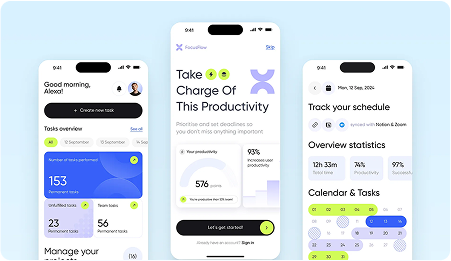
Top Mobile App Development Frameworks for iOS & Android App Development
Let’s talk about apps! Seriously, they’re, like, everywhere. For instance, you can order pizza and check your bank account. Anything you can think of. Consequently, businesses are scrambling to make the best apps fast. However, here’s the tea: picking the right app-making tool is important.
Thank you for reading this post, don't forget to subscribe!Essentially, it’s like the foundation of your app. You need it to run smoothly, handle lots of users, and be easy to use. Furthermore, are you making an iPhone app? An Android app? Or an app that works on both? The right tech is key to success.
Well, you have Swift, Kotlin, Flutter, and React Native. However, with so many choices, it’s easy to get overwhelmed. Don’t worry! Let’s find out which one works best for you!
1. Flutter – The Speed Demon
Table Of Content
Firstly, let’s talk about Flutter. AKA the MVP of app development. So, think of it like that one friend who’s always chill but still gets everything done fast. This one is crazy quick at building apps. Moreover, it makes them look like straight-up fire. And guess what? Google made it. Hence, that way, you know it’s legit.
The best part? One code, two platforms. Yup, write it once, and boom. It works on both iPhones and Androids. No more double the work, double the stress. Just smooth sailing and more time to make your app look sick.
Long story short: Flutter is a total game-changer for app developers. Is it easy, efficient, and honest? A lifesaver. No wonder people are obsessed with it.
Why is it awesome?
- Smooth UI with cool animations
- Hot reload (test changes instantly—no waiting!)
- Backed by Google (so you know it’s solid)
Who should use it?
If you wanna build apps quickly, with stunning visuals, and without writing separate code for Android and iOS.
2. React Native – The OG Cross-Platform King
Secondly, we have React Native. It’s this chill, too, created by Facebook. And it’s blowing up in the app dev world. Seriously, Android app developers and iOS app experts are all over it. You can code your app using JavaScript. Yep, it’s the same stuff you might use for websites. Also, it works on both Android and iPhones. That’s right, you build once, and it runs everywhere.
Moreover, this saves native mobile app development services tons of time and effort. In essence, it’s like a coding hack for getting your app out there and, you know, looking fire on any device. Plus, it’s a great way to make sure that everyone can use your app, no matter what phone they have. Therefore, it’s convenient.
Why is it awesome?
- Massive community (tons of support)
- Works great with existing apps
- Used by Instagram, Airbnb, and Uber Eats
Who should use it?
If you already know JavaScript and wanna build high-performance apps fast.
3. Swift – The iPhone’s Bestie
Thirdly, Swift is the language for iPhone apps. Like, if you’re making anything for iOS, this is what you need. Everyone’s glued to their phones, right? Well, Swift is how you make the magic happen. Wanna build the next viral app? This is your best bet. Also, Apple itself uses it, so you know it works.
It’s also way faster and more efficient than the old-school stuff. You can roll out features quickly, which means your app idea can turn out fast. And guess what? It’s pretty easy to learn! But don’t get it twisted—you still gotta put in the work.
Bottom line? If you’re serious about app development, Swift is a must. Master it, and you’ll be out here building your dream app in no time.
Why is it awesome?
- Blazing-fast performance
- Apple keeps improving it
- More secure than other languages
Who should use it?
If you’re all about that Apple life and want your app to run like a dream on iOS.

4. Kotlin – The Android Rockstar
What abouKotlinin? Let’s get this tea spilled! So, Google is obsessed with Kotlin for Android apps. Huh? Like, it’s giving that main character energy. So, take Java as that clunky old flip phone your parents refuse to throw away. And Kotlin? Yeah, it’s the sleek, all-glass, high-tech masterpiece that just feels different.
It cuts down your code. That way, you’re not drowning in bugs. Hence, that makes coding fun. Rare, right? Moreover, it lets you build apps faster. And if you’re wondering if Google loves it. It does! Why so? Because Kotlin is
- Modern
- Efficient
- crazy easy to learn
It’s a total game-changer.
Why is it awesome?
- Official language for Android
- Works perfectly with existing Java code
- Fewer crashes, more stability
Who should use it?
If you want the best Android performance without the headaches of Java.
5. Ionic – The Web Developer’s Dream
So, are you already vibing with web dev stuff? Like
- HTML
- CSS,
- JavaScript
- Ionic
Essentially, it lets you build apps that look and feel like they’re made for your phone, not just some website crammed into a box. Furthermore, you get to use the same coding languages you already know. Also, it’s way easier than trying to learn a whole new thing. Honestly, you just drag and drop some stuff, style it with CSS, and add some JavaScript magic, and bam! You’ve got an app. Plus, it’s efficient, so you can make apps faster. In short, it’s a cheat code for iOS application development. Moreover, you can make cool apps that feel like they belong on any phone.
Why is it awesome?
- Easy to learn (especially for web developers)
- Tons of pre-built UI components
- Works with Angular and React
Who should use it?
If you’re a web developer wanting to build mobile apps without learning new languages.
6. Xamarin – The Microsoft Powerhouse
Now, Xamarin is like a coding hack. Microsoft owns it. And that’s kinda a big deal. Essentially, you write your app code once, in C#, and boom! Then, it works on both iPhones and Androids. Moreover, you don’t have to rewrite everything twice. Like, seriously, it’s a huge time-saver. In other words, if you’re making an app, this is how you level up.
Therefore, you can focus on the cool features, not just the boring coding stuff. Furthermore, it cuts down on the headache of separate coding for each platform. Also, it helps you get your app out faster. Likewise, it’s like a shortcut to getting your app on everyone’s phones. Consequently, you can spend more time on other things. Ultimately, it’s a smart move for any app developer.
Why is it awesome?
- Works great with Microsoft tools (like Azure)
- Stable and reliable
- Native-like performance
Who should use it?
If you love Microsoft, C#, and enterprise-level apps.

7. PhoneGap (Apache Cordova) – The Old Reliable
PhoneGap, or like Apache Cordova, is the cheat code for turning your website into a legit app. Seriously, do you know
- HTML
- CSS
- JavaScript
Then you’re golden. Moreover, you can just wrap your website in this thing. Also, it , works on like all the phones
- iOS
- Android
You name it. Therefore, it’s a chill way to get your stuff out there. The best part? You don’t even need to learn a whole new coding language. In essence, a website-to-app to app converter. Consequently, you can make an app without the app development headache. You can create a mobile app using your existing web development skills.
So, yes, it’s a great tool for those wanting to build an app quickly. And if you want cross-platform app development. However, it is important to remember the limitations of this tool.
Why it’s awesome?
- Simple and easy to use
- Works on multiple platforms
- Huge plugin library
Who should use it?
If you already know HTML, CSS, and JavaScript and wanna convert a website into an app.
8. NativeScript – The Underrated Gem
NativeScript makes apps that work on any phone. You can use JavaScript, or, like, those fancy frameworks like
- Angular
- js,
And VOILA! You can whip up legit native mobile apps. In other words, you’re not stuck with just one operating system. Also, you get to use coding languages that are already popular. Furthermore, it’s a solid option if you wanna build apps that
- feel smooth
- run like they were made specifically for that phone
Moreover, it gives you the ability to get your app out there on both
- Android
- iOS devices
Also, it saves a bunch of time because you only have to write code once. And, you know, it’s pretty fire.
Why it’s awesome?
- 100% access to native APIs
- Great for UI-heavy apps
- Supports multiple frameworks
Who should use it?
If you’re an Angular or Vue.js fan who wants native-level performance.
9. Sencha Touch – The Business Pro
Sencha Touch is designed for enterprise apps. If you’re making a business app that needs high performance and security, this is your guy.
Why is it awesome?
- Optimized for large-scale apps
- Strong data management
- Supports touch gestures
Who should use it?
If you’re building a business or financial app that needs rock-solid performance.
10. jQuery Mobile – The Lightweight Champ
Lastly, jQuery Mobile is simple, lightweight, and easy to use. It’s great for basic apps that don’t need heavy animations or complex features.
Why is it awesome?
- fast and lightweight
- Works on older devices
- Easy to learn
Who should use it?
So, do you need a simple, fast-loading app without fancy features? Then, YES!
Which One Should You Choose?
Now, which framework is right for you? Here’s a quick cheat sheet:
So, you want a slick app that’s fast? Then, Flutter’s your vibe. Or are you already a JavaScript whiz? Then, React Native is gonna be your bestie. However, are you all about those shiny iOS apps? Then, Swift’s the way to go, no cap. What about being a die-hard Android stan? Damn! That means, Kotlin’s your ride or die.
In contrast, if you’re deep into the Microsoft world and love C#, check out Xamarin. A web dev looking to dive into apps? Then, Ionic or PhoneGap are your jam. Finally, if you’re building a serious enterprise app, Sencha Touch is where it’s at.
However, when you are hiring a mobile app development company, they will educate you on the best framework available for your needs. On the other hand, if you are going solo and creating it yourself, all you have to do is choose what feels good and fits your skills at the moment! Finally, don’t overanalyze it, pick whatever makes you feel comfortable and excited to build. Also, keep in mind that every framework has its community support; you won’t be alone. Hence, there are many tutorials and assistance available online.
Final Thoughts
So, yes, the best mobile app development tools are like the top gaming consoles: it all depends on what you enjoy! The right framework makes a difference in whether you are an Android app developer, an iOS app developer, or just have the idea behind the best app.
Now go forth and build that app!
Frequently Asked Questions
Mobile App Framework: A software platform that enables the development of mobile applications, with tools and libraries simplifying the process.
Some of the best mobile app frameworks include:
- Flutter (Google) – Fast, UI-rich, cross-platform apps
- React Native (Meta) – Popular, JavaScript-based, cross-platform
- SwiftUI (Apple) – Best for iOS apps
- Kotlin Multiplatform – Great for Android & iOS
- Xamarin (Microsoft) – NET-based, cross-platform
- Flutter: Install Flutter SDK → Use Dart to write code → Build UI with widgets → Compile & run
- React Native: Install Node.js → Use JavaScript/TypeScript → Write components → Use Expo or React Native CLI to build & test
- Android app developers
- cross-platform app development
- iOS application development
- Mobile App Development Company
- mobile app development tools
- native mobile app development services
Table Of Content






